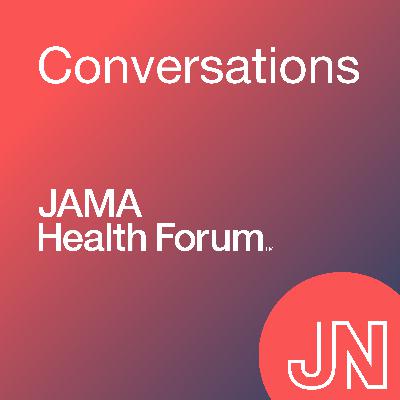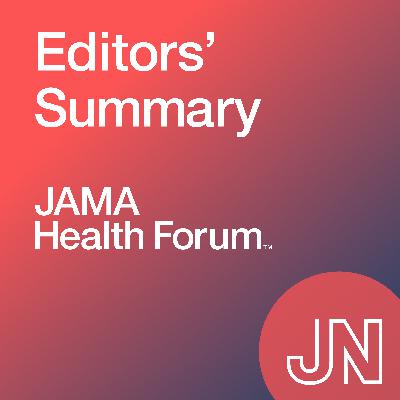Discover JAMA Health Forum Conversations
JAMA Health Forum Conversations

JAMA Health Forum Conversations
Author: JAMA Network
Subscribed: 29Played: 122Subscribe
Share
© 2025 American Medical Association. All rights reserved, including those for text and data mining, AI training, and similar technologies.
Description
JAMA Health Forum is an international, peer-reviewed, online, open access journal that addresses policies, structures, and systems that affect health, medicine, and health care. The journal publishes original research, evidence-based reports, and opinion about national and global health policy; structures and systems that affect health and health care; and health care delivery, economics, access, quality, safety, equity, and reform.
58 Episodes
Reverse
Historically, there has been less focus on primary care than on specialist care in US health care. What are the challenges and opportunities in primary care today? What might it look like in the coming decades? Robert Phillips, MD, MSPH, of The American Board of Family Medicine joins JAMA Health Forum Editor in Chief Sandro Galea, MD, DrPH, to discuss the future of primary care in the US. Related Content: Back to the Future of Primary Care
There is abundant evidence that sexual minority groups have worse health indicators than sexual majority groups. Gilbert Gonzales, PhD, MHA, of Vanderbilt University Medical Center joins JAMA Health Forum Editor in Chief Sandro Galea, MD, DrPH, to discuss the current policy landscape and its potential impact on the health of LGBTQ+ populations. Related Content: Health Implications of Recent Policy Changes Affecting LGBTQ+ Populations
Both sex- and gender-based factors influence the health of women. A fully realized population health agenda needs to center women's health as an area of conceptual and pragmatic focus. Rosa M Gonzalez-Guarda, PhD, MPH, RN, joins JAMA Health Forum Editor in Chief Sandro Galea, MD, DrPH, to discuss women's health, inequities, and how women's many and different identities shape their health. Related Content: The Consequences of Selective Defunding of Health-Relevant Research Areas
About 1 in 5 adults in the US live with a mental health condition. In 2023, approximately 32% of US adults reported symptoms of depression and anxiety. Ruth Shim, MD, MPH, of the University of California, Davis, joins JAMA Health Forum Editor in Chief Sandro Galea, MD, DrPH, to discuss how national policy can better support mental health in the US. Related Content: Toward a Strategy to Improve National Mental Health
The second Trump administration launched several actions in 2025 that directly affect the health of populations. Sara Bleich, PhD, of Harvard Chan School of Public Health joins JAMA Health Forum Editor in Chief Sandro Galea, MD, DrPH, to discuss the nonhealth policies that may matter most to health and warrant ever-more attention, particularly in a moment of policy turbulence. Related Content: The Health Consequences of Nonhealth Policies in a Time of Policy Disruption
The evolution of artificial intelligence technology has outstripped most health policy oversight in the US. Michelle M. Mello, JD, PhD, Professor of Law and Professor of Health Policy at Stanford University, discusses this and more with JAMA Health Forum Editor in Chief Sandro Galea, MD, DrPH. Related Content: Inaction on Artificial Intelligence Regulation in a Time of Upheaval
The US is an outlier in health system performance, spending more than other peer countries while performing worse. US economist David Cutler, who is the Otto Eckstein Professor of Applied Economics at Harvard University, discusses this and more with JAMA Health Forum Editor in Chief Sandro Galea, MD, DrPH. Related Content: On Making US Health Care Great and Affordable
Increased health insurance coverage in the US has had a broad range of positive impacts on US health, including increases in preventive care and better chronic disease management. Larry Levitt, MPP, of KFF joins JAMA Health Forum Editor in Chief Sandro Galea, MD, DrPH, to discuss challenges facing US health insurance coverage today. Related Content: The Ongoing, and Heightened, Threat to Health Insurance Coverage in the US A Backlash Against Health Insurers, Redux
The first months of the Trump administration have been marked by a flurry of actions, many that have affected agencies directly related to health domestically and globally. Joshua M. Sharfstein, MD, of the Johns Hopkins Bloomberg School of Public Health joins JAMA Health Forum Editor in Chief Sandro Galea, MD, DrPH, to discuss the contemporary threats to the health of the American public. Related Content: The Potential Consequences of Disinvestment in Health in the US
US withdrawal from the World Health Organization will have significant implications for global health. Lawrence Gostin, JD, JAMA Legal and Global Health Correspondent and Faculty Director of the O'Neill Institute for National and Global Health Law at Georgetown University, joins JAMA Health Forum Editor in Chief Sandro Galea, MD, DrPH, to discuss global health in an era of new uncertainty. Related Content: The US, the World Health Organization, and the Global Health Infrastructure
Incoming Editor in Chief Sandro Galea, MD, DrPH, discusses the journal and the state of health policy with Deputy Editor Julie Donohue, PhD, and Senior Editor Melinda Buntin, PhD. Related Content: JAMA Health Forum: Meet the Editor in Chief, Sandro Galea, MD, DrPH JAMA Health Forum—Paving the Way for the Future of Health Policy Science and Scholarship
Founding Editor in Chief John Ayanian, MD, MPP, reflects on the origins and the highlights of the journal's first 5 years, including seminal publications, the journal's current No. 1 slot in the rankings, and the amazingly collegial editorial team, with JAMA Health Forum founding Deputy Editor Melinda Buntin, PhD. Related Content: Reflections on the First 5 Years of JAMA Health Forum
Research shows that Tobacco 21 (T21) policies with a minimum legal age to purchase tobacco products of 21 years reduce youth smoking, yet their potential long-term impact varies across US states. Jamie Tam, MPH, PhD, of the Yale University School of Public Health discusses these findings with JAMA Health Forum Editor John Ayanian, MD, MPP, and Deputy Editor Melinda Buntin, PhD. Related Content: US Tobacco 21 Policies and Potential Mortality Reductions by State
Extreme heat in the US led to deaths and hospital admissions among community-dwelling older adults with low incomes. Hyunjee Kim, PhD, of the Oregon Health & Science University, and Jose F. Figueroa, MD, MPH, of Harvard University, discuss these findings with JAMA Health Forum Editor John Ayanian, MD, MPP, and Deputy Editor Melinda Buntin, PhD. Related Content: Heat Waves and Adverse Health Events Among Dually Eligible Individuals 65 Years and Older The Alarming Risks for Dually Eligible Beneficiaries During Heat Waves
The use of care by patients of physicians considered more altruistic differs from the use of care of physicians considered less. Lawrence P. Casalino, MD, PhD, MPH, of Weill Cornell Medicine, discusses his work around this with JAMA Health Forum Editor John Ayanian, MD, MPP, and Deputy Editor Melinda Buntin, PhD. Related Content: Physician Altruism and Spending, Hospital Admissions, and Emergency Department Visits
JAMA Health Forum Editor John Ayanian, MD, MPP, and Deputy Editor Melinda Buntin, PhD, spoke with Sherry Glied, PhD, and Dong Ding, MA, MPA, of New York University, about the effects of participation in health care savings accounts. Participation in flexible spending accounts is linked to higher health care and tax expenditures, while health care savings accounts do not reduce expenditures. Related Content: Health Care–Related Savings Accounts, Health Care Expenditures, and Tax Expenditures
AcademyHealth CEO Aaron Carroll, MD, MS, shares highlights from the AcademyHealth 2024 Annual Research Meeting in an interview hosted by JAMA Health Forum Editor John Ayanian, MD, MPP, and Deputy Editor Melinda Buntin, PhD. John and Melinda then discuss key findings from 4 highly rated abstracts presented at the meeting that were published concurrently as Original Investigations in JAMA Health Forum. Related Content: Coverage and Access Changes During Medicaid Unwinding Changes in Health Care and Prescription Medication Affordability in the US During the COVID-19 Pandemic Household Health Care Payments Under Rate Setting, Spending Growth Target, and Single-Payer Policies Pay-for-Performance Incentives for Home Dialysis Use and Kidney Transplant JAMA Health Forum Highlights From the AcademyHealth Annual Research Meeting
More than 50 million adults in the US are eligible to vote but not registered. Alister F. Martin, MD, MPP, of Harvard University, and Katherine McCabe, PhD, of Rutgers University speak with JAMA Health Forum Editor John Ayanian, MD, MPP, and Deputy Editor Melinda Buntin, PhD, about a program to register new voters in health care settings that has enrolled younger and racially and ethnically diverse adults. Related Content: Increasing Voter Participation Through Health Care–Based Voter Registration
JAMA Health Forum Editor John Ayanian, MD, MPP, speaks with Kelsey M. Owsley, PhD, of the University of Arkansas, and Sayeh Nikay, PhD, MPH, of the University of Minnesota, about how the 340B drug discount program influences the services offered by public and nonprofit hospitals. They also discuss new state policies and proposed federal policies to promote greater transparency and accountability in the 340B program. Related Content: US Hospital Service Availability and New 340B Program Participation Public Hospitals May Use the 340B Program Differently Than Nonprofit Hospitals
Benjamin D. Sommers, MD, PhD, of Harvard University, speaks with JAMA Health Forum Editor John Ayanian, MD, MPP, and Deputy Editor Melinda Buntin, PhD, about differences in Medicaid enrollment as measured in surveys and administrative data. These differences have implications for estimating coverage now that the federal policy of continuous Medicaid eligibility during the COVID-19 pandemic has ended. Related Content: Survey-Reported Coverage in 2019-2022 and Implications for Unwinding Medicaid Continuous Eligibility







